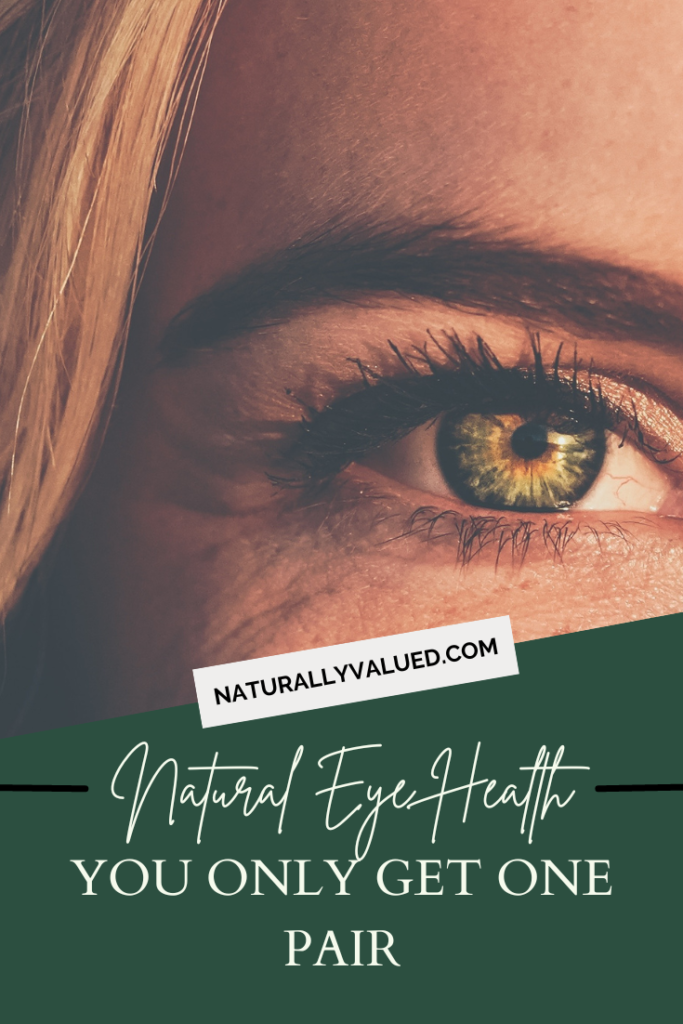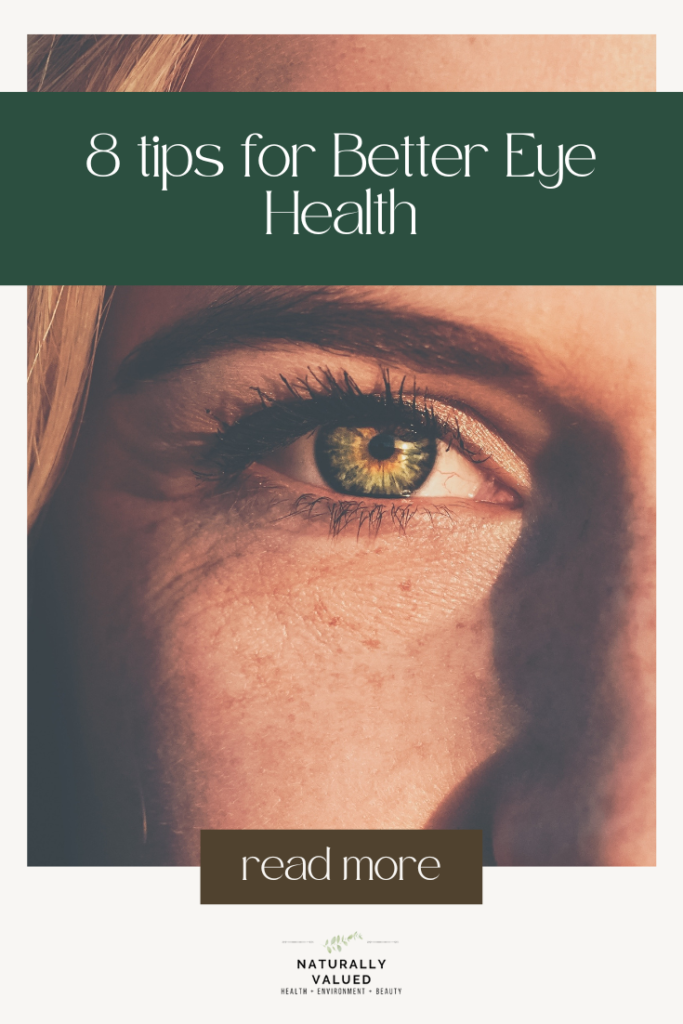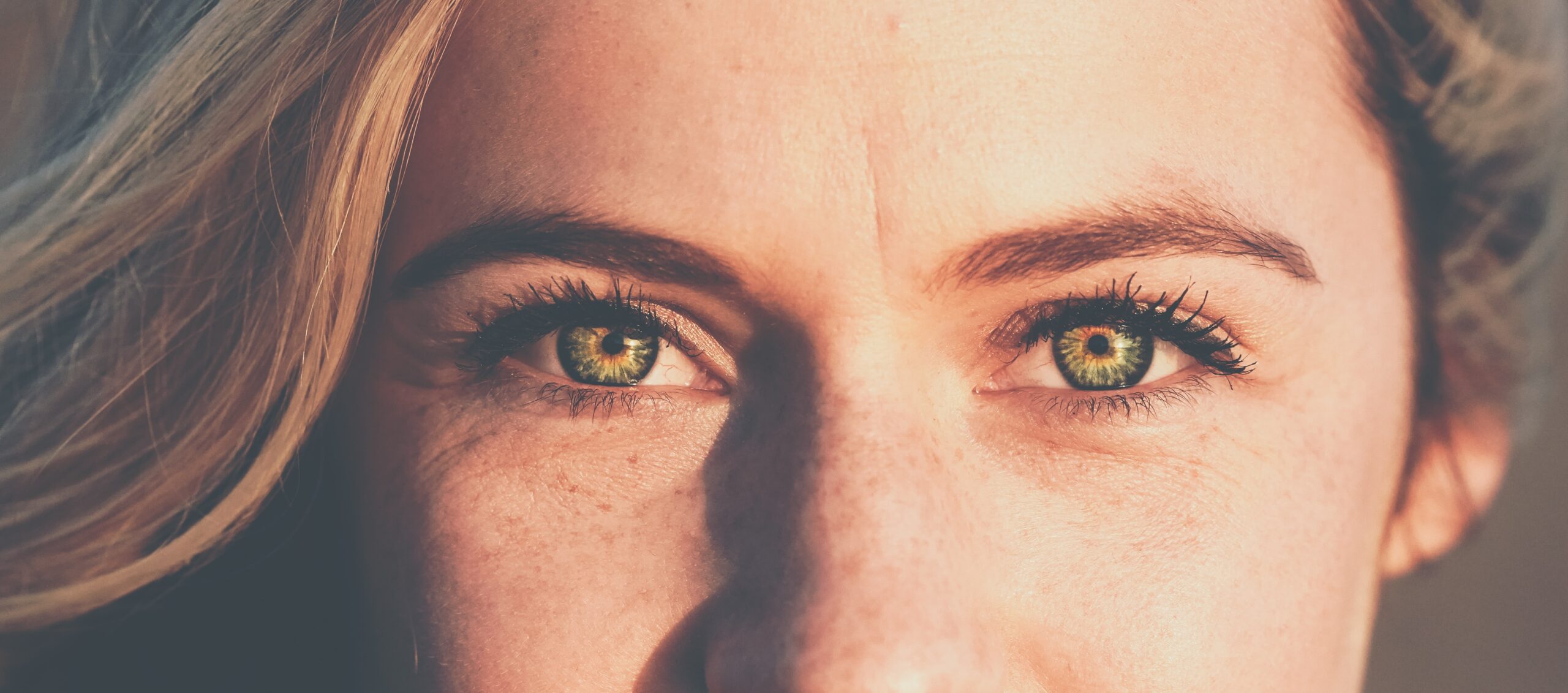The amount of screen time we receive per day is increasing. Especially working from home, working at a computer all day, checking our phones throughout the day and then watching a show or 2 in the evening. All that screen time exposes your eyes to blue light which is hard on our eyes. That is why at any age we need to be aware and take action toward better eye health. After all, you only get one pair of eyes, why not give them the best care you can? Here are some tips on how to naturally take care of the health of your eyes.
Hydration
Staying hydrated is essential for your overall health in so many ways. Why would eye health be any different? Dry eyes can impact visual function as well as comfort. Drinking water can help your body produce a healthy number of tears which will help dry eyes.1 To make sure I drink enough water in a day I have a large mason jar that holds 4 cups of water. That way I only have to remember to fill it once a day. I’ve also invested in my water filtration jug from Shaklee. It is certified to improve taste and reduce lead, mercury, and cadmium. The filter also has an 80-gallon life which is double of other leading brands, which means less waste.
20-20-20 Rule
Your eyes are surrounded by muscles and they need to be exercised just like other muscles in your body. Try looking away every 20 minutes for 20 seconds at an object 20 feet away to help reduce fatigue and eye strain.2
Limit screentime
We all know that it’s sometimes impossible to avoid screen time, but we can try to limit it. In the evenings, especially before bed, try reading a book, listening to an audiobook or podcast, or doing something that doesn’t involve a screen. This will give your eyes a break from the blue light exposure and you may even pick up a new hobby! To learn more about tips on how to limit your screentime check out this post
Wear sunglasses
Investing in good quality sunglasses is essential for protecting your eyes from the sun’s harmful UV rays, which can increase your risk of developing cataracts and macular degeneration.3 Those with blue eyes tend to be more sensitive to sunlight, so it’s important to wear sunglasses whenever you’re outdoors.
Visit the eye doctor
Make sure you are visiting the eye doctor regularly, this helps protect your vision and helps you see clearly. This will also help you take part in any preventative measures to maintain your eye health.
Plenty of sleep
Sleep is another one of these basic bodily needs that many of us tend to give lower priority to. Sleep is so important for your brain as sleep is the time when your brain makes connections. It is also very important to our eye health, 8-9 hours of sleep helps the brain-vision reaction speed stay sharp.4
Vitamins and nutrients your eyes need
Omega-3s, vitamin c, beta carotene, lycopene, lutein, and zeaxanthin are just a few of the nutrients that will help improve your eye health. The combination of lutein and zeaxanthin are 2 carotenoids the retina actively accumulates and they absorb damaging wavelengths of light, like a little pair of microscopic sunglasses.5
A great supplement I have found and take every day is Shaklee’s Carotomax. I started taking this a few years ago now I was noticing a decline in my eyesight by evening. While crocheting I would feel my eyes start to shake and I would have trouble focusing on what I was working on.
So I decided I had to take action before this became a larger issue. I started using my blue light glasses every day and taking Shaklee’s Cartomax every morning in my Vita strip. I have noticed a difference in my eyes, I do not experience the fatigue and strain I did before.
Cartomax has a unique blend of 6 carotenoids. Carotenoids are powerful fat-soluble antioxidants that provide protection to your cells and have been suspected to aid in the long-term health of the eyes, prostate, cervix, lungs, and heart. Research also suggests that carotenoids, working together, support a strong immune system.
Add these foods to your diet
Foods like salmon and other fatty fish are good sources of omega-3s. Grapefruit and other citrus fruits contain vitamin c which has been suggested to help lower the risk of developing cataracts. Blueberries and purple cabbage contain bioflavonoids and antioxidants. Kale, broccoli, and raw spinach are great sources of lutein.4
Hopefully, this list gives you a few items to focus on to help you take care of your eye health. It is easier to take care of and maintain healthy eyesight rather than waiting until it becomes a bigger issue and then trying to reverse the effects. Our bodies are amazing and can do incredible things when given the right nutrients to build with.
To find out specifically what YOUR body needs based on your goals, diet, and lifestyle check out this Free Health Assessment. Click the button below…
**This article is written for informational purposes only. These products are not intended to diagnose, treat, cure, or prevent any disease. These statements have not been evaluated by the Food and Drug Administration.


1. https://www.healthline.com/health/dry-eye/ask-the-expert-dry-eye-dehydration#drinking-water
2. https://opto.ca/eye-health-library/20-20-20-rule
4. https://go.shaklee.com/eating-for-your-vision/
5. https://healthresource.shaklee.com/eye-health-story-behind-areds-2/



